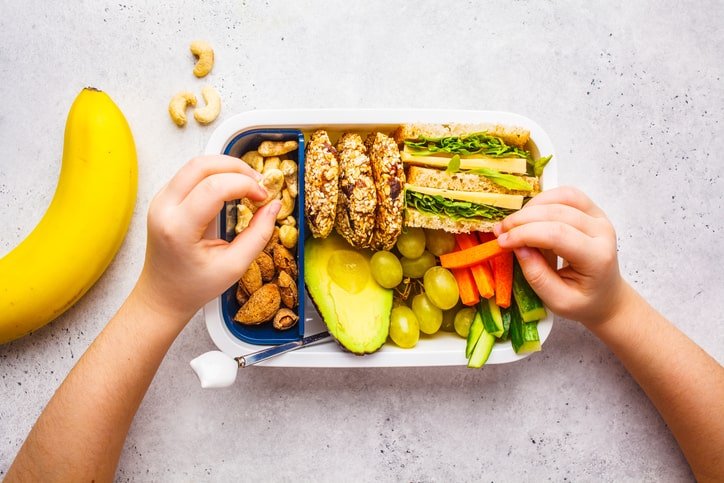Should Kids Take a Multivitamin?

All parents want their children to be healthy. That means getting the proper amount of sleep, eating a nutritious diet – including lots of fruits and veggies – and getting plenty of exercise.
In your quest to help your little one grow big and strong, you’re probably wondering if your child needs a multivitamin, especially considering the number of chicken nuggets they consume and the half-empty plate of green foods left over at the end of a meal.
If you think back to your upbringing, your parents likely set out a tart-tasting vitamin C tablet or the infamous gummy bear multivitamin. Let's face it—kids eat what they want and not necessarily what they should. So, if the multivitamin quandary is one you find yourself constantly debating, you're not alone.
Dr. Sanjay Gupta, a CNN chief medical correspondent, referenced a report in the October 2007 issue of Archives of Pediatrics stating that about a third of American children take vitamin supplements, the majority being a daily multivitamin. While supplements offer vital nutrients, do kids need a multivitamin to be healthy?
Pros And Cons Of Multivitamins For Kids
The main reason for giving your child a multivitamin and the most significant benefit is to supplement any nutritional deficiencies in your child’s diet due to medical conditions or not consuming enough whole foods. Pediatrician Laura O’Connor, MD, told the Cleveland Clinic that children’s vitamins are similar to a safety net or taking out an insurance policy—you might not need it, but it’s a good idea.
However, there are a few dangers parents need to be aware of when giving children supplements. The first is overdosing, whether due to receiving too much of a particular vitamin or when a little one gets into the vitamin cupboard unsupervised. The AAP also notes that large multivitamin doses can be toxic, resulting in nausea, headaches, loose stools, and rashes.
It’s important to note that the FDA doesn’t regulate vitamins, so parents should be vigilant when reading the label and administering the recommended dose. It’s essential to ensure the total amount of nutrients from added vitamins and minerals doesn’t exceed the safe limit for your child’s age group and that they don’t interact with medicines your child takes.
The Most Important Vitamins For Kids

According to the National Library of Medicine, vitamin needs are generally consistent among genders and children. However, there are a few exceptions. For example, children and adolescents who weigh more will need a higher dose to receive their essential nutrients than toddlers or others with a low weight. Also, those who are menstruating will need a higher dose of iron and folate.
Here are the six most essential vitamins for kids according to the AAP:
-
Vitamin D
Vitamin D is responsible for bone and tooth formation while helping to regulate mineral absorption. According to Dr. Sanjay Gupta and many other experts, vitamin D deficiency is the most important concern among all children. She says, “Rickets is a disorder that becomes apparent during infancy or childhood and is the result of insufficient vitamin D in the body.” Because breast milk doesn’t contain enough vitamin D, this deficiency is most common in breast-fed children. The University of Pittsburgh Medical Center (UPMC) states, “Research estimates that 15% of children ages 1 to 11 years old and 17% of teens have vitamin D deficiency.”
Without taking an additional vitamin D supplement, our body can receive it in several ways. The first is through food, including dairy products, egg yolks, and fish oils. Our bodies can also make vitamin D when our skin is exposed to sunlight. The American Academy of Pediatrics recommends 400 IU of vitamin D per day for breast-fed babies younger than 12 months and the same for formula-fed babies until they consume 32 ounces of formula daily. Toddlers and adolescents require around 600 IU of vitamin D per day.
-
Iron
Iron is responsible for building muscles and blood production. You can find it in meat, eggs, or iron-fortified cereal. UPMC states that “Full-term newborns have enough iron stored to last provide their needs for the first six months,” which is when they’re able to start supplementing with iron-rich foods. However, they may have an iron deficiency if there is a complication during pregnancy, they are born premature, have a low birth weight, or are breastfed.
3. Vitamin A
Vitamin A is responsible for healthy skin, tissue repair, night and color vision, and overall growth. It’s typically found in dairy products, yellow veggies, and liver.
-
Vitamin B
Vitamin B is responsible for metabolic activities and red blood cell formation. It’s typically found in meats, fish, dairy, eggs, and whole grains.
-
Vitamin C
Vitamin C is responsible for healing bones and wounds, strengthening skin, muscle, and connective tissue, and helping build up infection resistance. It’s most commonly found in fruits and vegetables such as spinach, Brussels sprouts, strawberries, tomatoes, and citrus fruits.
-
Calcium
A calcium supplement can help develop proper bone development. It’s typically found in yogurt, cheese, milk, and some veggies, like spinach and broccoli.
Do Kids Need To Take A Multivitamin?
According to HealthyChildren.org, the official stance of the American Academy of Pediatrics (AAP) is that a healthy child who consumes a typical, balanced diet doesn't need any type of supplementation from a vitamin. While the body is unable to produce certain vitamins, it takes what it needs from food.
Even when you don’t think your little one is consuming enough nutritious food or is a picky eater, the AAP says most parents have nothing to worry about as long as their child is growing and seems healthy. Children don’t need an overabundance of vitamins, so eating a healthy diet from a variety of food groups is likely to cover their nutritional needs.
Many food items geared toward children, including yogurt, milk, waffles, and cereal, are likely fortified with additional vitamins to keep your little ones healthy. Plus, fat-soluble vitamins, including A, D, E, and K, are stored in your body to use later.
However, there are instances when a child’s diet does not provide all of the essential vitamins and minerals. In these cases, they may need to be supplemented with a multivitamin.
When Do Kids Need Vitamins Or Supplements?

For various reasons, getting the correct amount of vitamins through diet alone isn't always that easy. According to The Mayo Clinic, there are some legitimate reasons to give young children a multivitamin. They include food allergies, including lactose intolerance, chronic diseases that affect nutrient absorption, such as cystic fibrosis, delayed developmental and physical growth, and a restrictive diet, such as a vegan diet.
Best Vitamins Available For Kids
Still not sure if you should give your child vitamins? Bring it up with your child's pediatrician, dietitian, or healthcare provider at their next physical. If you’re looking for a trusted multivitamin for your child, here are the top choices we recommend.
Best Overall Kids Multivitamin
With a total of 13 essential nutrients, including vitamin D3 for immunity and vitamin K to support bone health, SmartyPants Kids Formula Daily Gummy Vitamins is a great daily multivitamin for kids. This chewable supplement is packed with all the vitamins kids need most. Plus, it’s made with no synthetic colors, artificial flavors, or sweeteners. They’re also gluten-free and allergy-friendly.
Best Organic Kids Multivitamin
If you’re looking for an organic option, MaryRuth’s offers a ton of safe options. MaryRuth's Organic Kids Multivitamin Gummy is recommended for ages four and up, this multivitamin contains vitamins A, C, D3, and E to support immune function and healthy development. Don’t worry about any of the bad stuff because these vitamins contain no gelatin, dairy, nuts, gluten, wheat, soy, or corn.
Best Kids Multivitamin With Iron
Since iron is one of the most important vitamins for kids, your little one may need a little help getting the proper amount. Renzo's Picky Eater Vegan Multivitamin for Kids with Iron is a vegan multivitamin that helps kids get enough iron for immunity, cardiovascular, and cell membrane health.
This vegan vitamin option offers 18 essential vitamins and minerals to support overall wellness. They dissolve in your kids’ mouths for easy absorption and contain no added sugar.
Best Kids Multivitamin Subscription
Sometimes the most difficult part of getting your child to take a multivitamin is remembering to order another bottle before the old one runs out. To ensure you always have an adequate supply, opt for a multivitamin subscription like Hiya Health.
Hiya Kids Daily Multivitamin is made with 12 fruits and vegetables and no added sugar. You’ll receive an eco-friendly and fresh pouch of vitamins each month to pour into your refillable glass container.
Best Liquid Kids Multivitamin
While infants can’t chew yet, they might need help filling nutritional gaps. For young babies or toddlers who don’t like taking their daily vitamins, consider these Garden of Life Baby Multivitamin Drops.
These vitamin drops are certified USDA organic, made from real food, and contain 12 essential vitamins and minerals.
Best Kids Multivitamin With Probiotics
Probiotics can be helpful for digestive support. If your child needs a little help being regular and having healthy belly bacteria, the Multivitamin + Probiotic Gummy from OLLY Kids combines daily vitamins with a probiotic.
Best Vegan Kids Multivitamin
In addition to being vegan, the Llama Naturals Plant-Based Multivitamin for Kids contain no added cane sugar, cavity-causing acids, or food coloring. Instead, they’re made from 9 pounds of organic fruits and vegetables, including apples, carrots, strawberries, broccoli, and more. These plant-based multivitamins claim to boost your child’s energy, mood, memory, and immunity.
Best Budget-Friendly Kids Multivitamin
You don’t have to spend a lot of money to ensure your kids are receiving all the required vitamins and minerals. Zarbee's Toddler Complete Multivitamin contain an excellent source of vitamins A, C, D, and E to support a healthy diet. This budget-friendly option is also free of gluten, soy, nuts and dairy!

